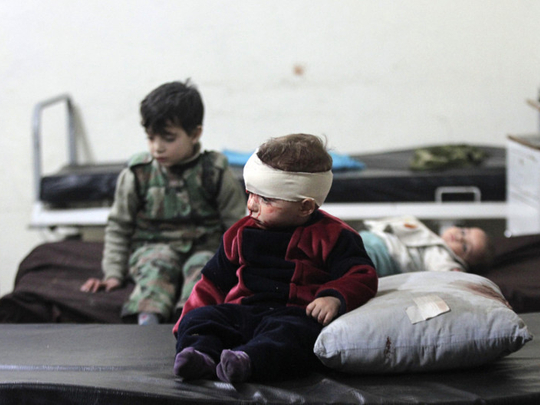
Geneva: The UN children’s agency Thursday launched its biggest ever appeal for $3.1 billion to help 62 million children at risk from a “new generation of humanitarian crises”.
The threats ranged from the brutal conflict in Syria that shows no sign of ending after nearly four years to the Ebola outbreak in west Africa and the Ukraine crisis.
“From deadly natural disasters to brutal conflicts and fast-spreading epidemics, children across the world are facing a new generation of humanitarian crises,” said Afshan Khan, Unicef’s director of emergency programmes.
“The scale of the crises, their duration and impact are unprecedented,” she told AFP.
Khan said although child fighters were recruited in earlier wars in poorer countries, it was now increasingly becoming common in middle-income nations such as Syria.
“We have information that thousands of children, mainly boys between the age of 13 and 18, are being recruited by armed groups in Syria,” she said.
“What is new is also that the groups are paying stipends to the families of the children,” Khan said.
The aid appeal is $1 billion higher than last year and targets 98 million people — two-thirds of them children — in 71 countries.
Khan said 20 per cent of the total aid appeal was aimed at investment in education, “the bridge to the future”.
According to Unicef, more than one in 10 of the world’s children — or 230 million — currently live in countries and areas hit by armed conflicts.
The largest chunk of the appeal — $903 million — is aimed at helping children in Syria and the sub-region.
“I have just returned from Syria and Lebanon where millions of children have had their lives torn apart,” said Khan.
“Half of the children in Syria are out of schools and one-third of the schools have been destroyed,” she said.
According to Unicef at least 160 children died in attacks on schools last year in the country.
More than eight million Syrian children have been affected by the civil war, with 1.7 million now living as refugees, according to the latest UN figures.
The agency is also targeting raising $500 million to help Ebola victims in west Africa and prevent fresh outbreaks.
A major problem area in Africa is Nigeria where attacks by the Islamist Boko Haram group have intensified, displacing more than one million people in the country’s northeast.
Human Rights Watch said in October that more than 500 women and girls have been abducted since the Boko Haram insurgency began in 2009, although other estimates put the figure much higher.
“I don’t see the Boko Haram menace ending in the near future and what is very worrying for us is that the kidnapping of children, especially girls, is spilling over from Nigeria to neighbouring countries,” Khan said.
“We could be faced with a huge humanitarian sub-regional crisis,” she added.
Unicef is also seeking $32.5 million for Ukraine, where about 5.2 million people are living in war zones, over 600,000 people have been internally displaced and some 1.7 million children have been affected by the conflict.
The appeal also targets donations for hugely underfunded crises which have fallen off the radar such as Afghanistan (35 per cent funded in 2014) and Palestine (23 per cent funded last year).
“Afghanistan cannot afford to be forgotten just because it is no longer in the headlines,” Khan said. “Severe malnutrition affects more than 30 per cent of children and we cannot forget that.”












